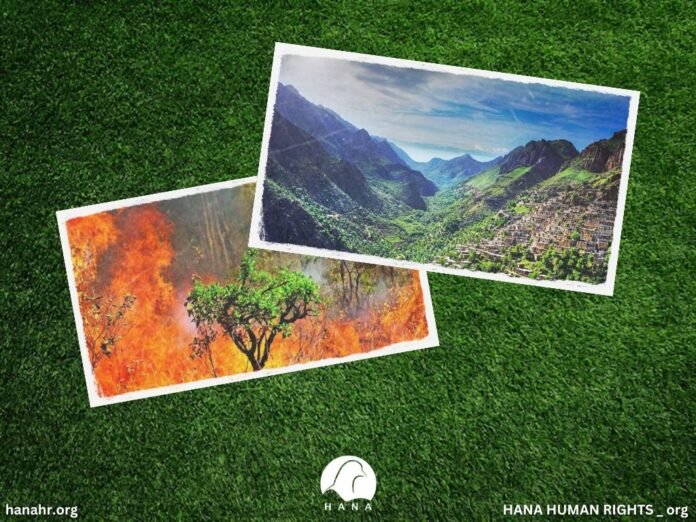June 5 has been designated by the United Nations as World Environment Day. This designation aims to raise public awareness regarding the preservation of a healthy environment as a fundamental human right.
Hana Human Rights Organization, while commemorating this day, considers environmental rights education a fundamental step in supporting and protecting the environment for a sustainable future.
Accordingly, Hana Human Rights Organization strives—alongside regular reporting on environmental issues—to utilize all available resources to promote and provide public education on environmental rights.
The right to a healthy environment reflects core human rights such as the right to life, health, and an adequate standard of living.
Although political disputes between states have so far prevented the formulation of a comprehensive legal definition of the right to a healthy environment, international instruments have referred to various aspects of this right in a fragmented manner. One of the most essential components of this right is access to environmental information.
According to Principle 10 of the Rio Declaration—one of the foundational documents on environmental protection—every individual shall have access to all information held by public authorities regarding the environment, including information on hazardous materials and environmentally harmful activities in their place of residence.
Hana Human Rights Organization affirms that this fundamental right to access environmental information is systematically violated by state authorities in the cities of Kurdistan. The government has deliberately and purposefully deprived Kurdish citizens of public access to information about environmental crises and destructive mining activities.
For years, the Islamic Revolutionary Guard Corps (IRGC), through its military and economic presence, has contributed to the large-scale destruction of the environment in Kurdistan. This military presence, along with the environmentally destructive mining activities of affiliated IRGC-owned companies, has even led to the degradation of protected areas.
For instance, the Shaho Highlands, located in the northern section of Hawraman and part of the Zagros mountain range, were designated a protected area in 2009 (1388 in the Iranian calendar) following a resolution by the Supreme Council for the Environment.
According to Article 5 of the Executive By law of the Law on the Protection and Improvement of the Environment (ratified in 1975), a protected area refers to a region of natural resources—including forests, rangelands, plains, water bodies, and mountains—that is of particular importance for the preservation and reproduction of wildlife species or for the conservation and regeneration of vegetation and natural conditions, and is therefore placed under protection.
Under this by law, carrying firearms and shooting in protected areas is prohibited.
The importance of these areas is such that even entry is subject to the strict limitations set forth in the guidelines of Paragraph (a), Article 3 of the same law, which regulate access and movement within these zones.
According to Article 5 of the directive, entry into these areas is permitted solely for ecotourism purposes and only under the condition that wildlife remains undisturbed.
Despite these legal restrictions—and the implicit criminalization of violations under environmental and penal codes—the Shaho and Kowsalan protected areas have, in practice, been under the de facto control of the IRGC for many years.
Based on investigations by Hana Human Rights Organization, the IRGC, under the pretext of ensuring security and combating Kurdish opposition parties, has built military installations and training garrisons in the region.
This militarization and repeated destructive military drills in the area fall squarely under the definition of eco-terrorism.
In international law, a number of conventions have been established for the protection of the environment, most of which pertain to periods of armed conflict. Among these international instruments is the 1976 United Nations Convention on the Prohibition of Military or Any Other Hostile Use of Environmental Modification Techniques (ENMOD Convention).
This is the only environmental convention applicable during peacetime, particularly in relation to military exercises.
Although Iran signed this convention on May 18, 1977, it has not yet ratified it.
According to the provisions of this convention—which many of whose principles have attained the status of customary international law—any hostile use of the environment and natural resources is strictly prohibited.
Despite these legal prohibitions under both domestic and international law, the Islamic Revolutionary Guard Corps (IRGC) has, for years, conducted military exercises in the region—including missile tests and the use of unconventional weaponry.
This hostile militarization has led to recurrent wildfires and the destruction of rare animal species and indigenous plant life.
In addition, contamination of the Shaho springs, which serve as the primary source of drinking water for local residents, constitutes another serious environmental crime in this region.
It is worth noting that raising awareness about these environmental disasters has been one of the main reasons for the arrest of Kurdish environmental activists in recent years.
Among the most damaging consequences of the IRGC’s presence are the environmentally harmful mining operations carried out by companies affiliated with this military-security institution.
The environmental threats posed by gold exploration projects in the Qorveh, Saqqez, and Baneh regions constitute one of the most severe ongoing ecological crises in Kurdistan.
According to environmental activists and experts, one of the most devastating impacts of these operations is the drying up of water sources used in the process of gold extraction, which is expected to lead to a long-term environmental catastrophe.
Hana Human Rights Organization, while expressing deep concern over the environmental crisis in various cities of Kurdistan and its link to the economic presence of the Islamic Revolutionary Guard Corps (IRGC), affirms that the right to a healthy environment is a fundamental human right.
The state is obligated to respect and uphold this essential right.
In line with its human rights mission, Hana will continue to regularly publish reports on the state of the environment and the legal frameworks governing it in order to raise public awareness and promote accountability.

